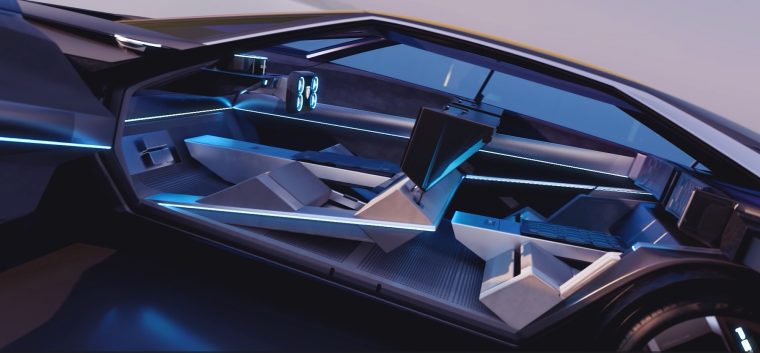Stratasys 3D Fashion technology to support new era for brand’s electric vehicles.
Produces visually impactful interiors incorporating 3D printed patterns onto velvet.
Stratasys Ltd. (Nasdaq: SSYS), a leader in polymer 3D printing solutions, today announced that global automotive manufacturer Peugeot has integrated Stratasys’ innovative 3DFashion™ technology into the interior of its new Inception concept, achieving a level of resolution that would not have been possible with traditional embellishment methods.
Heralding a new era for the Stellantis-owned Peugeot brand and embodying its vision for future electric vehicles, the Inception concept is the first design manifesto led by the company’s brand design director, Matthias Hossann, and represents a major change for the marque. The car incorporates an interior design described by the company as ‘revolutionary’, and features advanced materials produced exclusively using Stratasys J850™ TechStyle™ 3D printers.
The vehicle interior of the Inception concept is aligned with Peugeot’s new design architecture for electric vehicles. It features a minimalistic cockpit designed to support the car’s overall objective of reinventing the driver experience. Integral to this experience are immersive seats covered with a velvet made from 100% recycled polyester. This velvet extends onto the floor and features stunning 3D patterns created with Stratasys’ 3D printing technology.
“At Peugeot, we always like to combine function with aesthetics,” said Maud Rondot, CMF Designer, Advanced Design Team at Peugeot, the department responsible for the future vision of the Peugeot brand. “Our objective with the Inception concept’s seating area was to modernize the velvet material used and decompartmentalize the design by extending it to also serve as a visually impactful floor mat,” she explained.
According to Rondot, where the floor area space would typically need to be treated with a protective overlay, the Inception concept instead leverages direct-to-textile 3D printing to deliver a unique coalescence of functionality, texture and aesthetics. She believes this would not have been achievable with other technologies.
“Although we have access to relatively flat designs with current embellishment methods, it is not possible to build thickness and height. This is why we turned to Stratasys, and it is thanks to the company’s exclusive 3DFashion technology that we could 3D print directly onto the flexible material,” she added. “Often, there is a delta between what we imagine and what we can obtain, so it was quite magical to see our idea arrive precisely as envisaged and with a remarkable quality of execution.”
A fundamental theme of the Inception concept aims to capture the relationship between materials and light, which required the Peugeot Advanced Design team to use materials that would befit the car’s specific look and embody the brand’s vision for future electric vehicles.
To support this move towards new architecture, new space and decompartmentalization, Peugeot worked with single material effects. This saw the team select a metallic shade for the velvet, which is designed both visually and symbolically to play with light and convey something more futuristic, before using the J850 TechStyle 3D printer to create the semi-transparent ‘micro-architectures’.
“Instead of covering the whole stretch of material, it was really advantageous that we could leave the velvet visible,” Rondot added. “3D printing gave us the ability to modify and reprint the files very easily, but also important is its durability and efficiency; indeed, as a technology it doesn’t require molds, which is revolutionary in terms of industrialization.”

 Deutsch (Germany)
Deutsch (Germany)  Polski (PL)
Polski (PL) 









